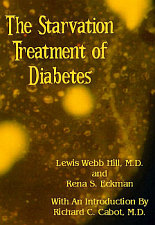
Starvation Treatment of Diabetes

Description
of Diabetes
With a Series of Graduated Diets
used at the
Massachusetts General Hospital
By
Lewis Webb Hill, M.D.
Rena S. Eckman
Introduction By
Richard C. Cabot, M.D.
The purpose of this little book is to furnish to the general practitioner in compact form the details of the latest and most successful treatment of diabetes mellitus.
Larger Print, 11 point font
**************
Excerpt:
The "starvation treatment" of diabetes, as advanced by Dr. Frederick M. Allen of the Rockefeller Institute Hospital, is undoubtedly a most valuable treatment. At the Massachusetts General Hospital it has been used for several months with great success, and it is thought worth while to publish some of the diets, and details of treatment that have been used there, as a very careful control of the proteid and carbohydrate intake is of the utmost importance if the treatment is to be successful.
In carrying out the Allen treatment the physician must think in grams of carbohydrate and proteid-it is not enough simply to cut down the supply of starchy foods; he must know approximately how much carbohydrate and proteid his patient is getting each day. It is not easy for a busy practitioner to figure out these dietary values, and for this reason the calculated series of diets given here may be of service. The various tests for sugar, acetone, etc., can, of course, be found in any good text-book of chemistry, but it is thought worth while to include them here for the sake of completeness and ready reference. The food table covers most of the ordinary foods.
For forty-eight hours after admission to the hospital the patient is kept on ordinary diet, to determine the severity of his diabetes. Then he is starved, and no food allowed save whiskey and black coffee. The whiskey is given in the coffee: 1 ounce of whiskey every two hours, from 7 a.m. until 7 p.m. This furnishes roughly about 800 calories. The whiskey is not an essential part of the treatment; it merely furnishes a few calories and keeps the patient more comfortable while he is being starved. If it is not desired to give whiskey, bouillon or any clear soup may be given instead.
The water intake need not be restricted. Soda bicarbonate may be given, two drachms every three hours, if there is much evidence of acidosis, as indicated by strong acetone and diacetic acid reactions in the urine, or a strong acetone odor to the breath. In most cases, however, this is not at all necessary, and there is no danger of producing coma by the starvation. This is indeed the most important point that Dr. Allen has brought out in his treatment. At first it was thought best to keep patients in bed during the fast, but it is undoubtedly true that most patients do better and become sugar-free more quickly if they are up and around, taking a moderate amount of exercise for at least a part of the day. Starvation is continued until the urine shows no sugar. (The daily weight and daily urine examinations are, of course, recorded.)
The disappearance of the sugar is rapid: if there has been 5 or 6 per cent., after the first starvation day it goes down to perhaps 2 per cent., and the next day the patient may be entirely sugar-free or perhaps have .2 or .3 per cent. of sugar. Occasionally it may take longer; the longest we have starved any patient is four days, but we know of obstinate cases that have been starved for as long as ten or eleven days without bad results. The patients tolerate starvation remarkably well; in no cases have we seen any ill effects from it. There may be a slight loss of weight, perhaps three or four pounds, but this is of no moment, and indeed, Allen says that a moderate loss of weight in most diabetics is to be desired.
A moderately obese patient, weighing say 180 pounds, may continue to excrete a small amount of sugar for a considerable period if he holds this weight, even if he is taking very little carbohydrate; whereas, if his weight can be reduced to 170 or 160, he can be kept sugar-free, with ease, on the same diet. This is very important: reduce the weight of a fat diabetic, and keep it reduced.
124 pages - 5½ x 8½ softcover
















